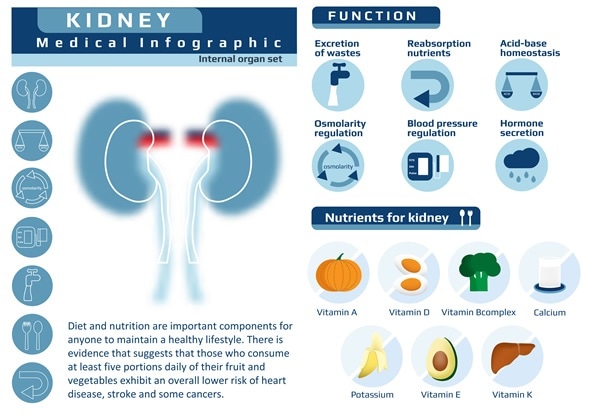The kidneys are two vital organs located in the abdominal cavity, just below the ribs. They are required for numerous regulatory functions which include:
- Removing of liquid waste from the blood as urine
- Maintaining a balance of substances in the blood
- Producing the hormone erythropoietin for the formation of red blood cells
- Regulating blood pressure

Function and nutrition supplement of kidney, Image Copyright: nipada_hong / Shutterstock
Diet and nutrition are important components for anyone to maintain a healthy lifestyle.
There is evidence that suggests that those who consume at least five portions daily of their fruit and vegetables exhibit an overall lower risk of heart disease, stroke and some cancers.
Should a person have kidney disease, then their dietary needs will likely change with disease progression depending on how much remaining kidney function there is amongst other factors.
Often there will be an eating plan which is composed with the help of a dietician – this tends to be individualised based on blood test results.
People with kidney disease may need to control the following constituents of their diet in order to keep the levels of electrolytes, minerals, and fluid in the body appropriately balanced.
Protein
Protein is imperative for the maintenance of body tissue, development of some hormones and antibodies and is involved in necessary molecular transport in the body.
The amount of protein needed is based on body size, extent of kidney function, and the amount of protein that may be in the person’s urine.
Ingesting too much protein can cause waste buildup in the blood which the kidneys may not be able to remove. On the other hand, protein intake should not be too low, or it may cause problems in building bone and muscle.
Sodium
Intake is usually in the form of salt (sodium chloride) and due to its electric charge, Sodium is necessary for muscle contraction and nervous transmission, fluid balance and blood volume (hence blood pressure).
If kidney function is hampered, sodium level in the body is poorly regulated. Too much sodium can cause fluid accumulation, swelling, higher blood pressure, and strain on the heart.
Importantly, when trying to reduce sodium intake, salt substitutes in some products might be more harmful than good, as many contain potassium, which may also need limited intake.
Potassium
Good sources of potassium include bananas, citrus fruits, potatoes, lima beans, and most meats and fish. Like sodium, potassium is required for muscle and nervous function. However, it specifically affects cardiac muscle contraction due to its role in heart rhythms.
It also has a role in the metabolism and assimilation of carbohydrates and building of muscle.
Low potassium (hypokalemia) can cause weak muscles, abnormal heart rhythms, and slightly higher blood pressure, although high potassium (hyperkalemia) may also cause abnormal and dangerous heart rhythms.
Calcium and Phosphorus
Calcium and phosphorus are key in supporting the skeletal structure and preventing the advancement of bone diseases such as osteoporosis.
In addition, calcium is involved in cellular signalling, wound clotting, muscular activity (contraction) and nervous function whilst Phosphorus is required in processes including energy production and pH homeostasis.
As kidney function worsens, phosphorus levels rise in the blood, causing the bones to weaken. Due to this, it might be necessary to limit phosphorus intake – this may involve consuming less dairy products.
As foods rich in phosphorus are often high in calcium too, limiting phosphorus intake might require the person to take Calcium supplements and Vitamin D.
Fluids
In the early stages of kidney failure, fluid intake doesn’t have to be limited but as the condition worsens, or when a person is on dialysis, careful monitoring is required.
The patient’s doctor will let them know how much should be drunk every day, whether this is water or foods that contain a lot of water, such as soups, grapes and celery.
For those on dialysis, fluid intake is controlled between treatments as most people on dialysis urinate very little.
Without urination, fluid accumulation occurs in the heart, lungs, and ankles, which may lead to breathing difficulties (this requires medical attention).
Additionally, it is important that nutritional intake contains enough calories because many patients become malnourished, particularly in later stages of the disease.
A person suffering from chronic kidney disease should have a diet with:
- Reduced sodium
- Reduces phosphate
- Sufficient calories
- Controlled protein intake (as indicated below)
During pre-dialysis, reduced protein is required as high amounts may damage the nephrons and thereby enhance the progression of kidney disease.
During dialysis, fluids and compounds such as phosphate and potassium should also be carefully monitored. More protein is required to replenish the lost during dialysis and excess catabolism following haemodialysis sessions.
References
Further Reading
Last Updated: Dec 30, 2022